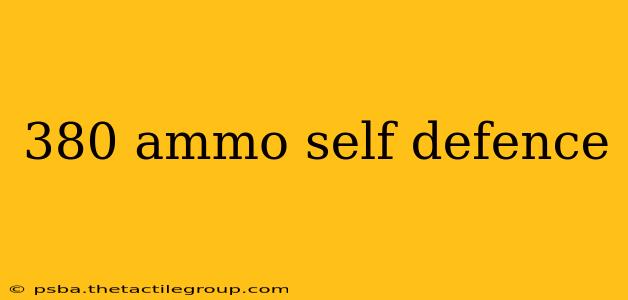Choosing the right ammunition for self-defense is a critical decision, and the .380 ACP (Automatic Colt Pistol) cartridge deserves careful consideration. While not the most powerful caliber available, its manageable recoil, concealability, and availability make it a popular choice for personal protection. This guide will delve into the key aspects of .380 ammo for self-defense, helping you make an informed choice.
Understanding the .380 ACP Cartridge
The .380 ACP, also known as 9mm Kurz or 9x17mm, is a relatively small-caliber handgun cartridge. Its smaller size contributes to its ease of concealment, making it ideal for individuals who prioritize discreet carry. However, its smaller size also means a trade-off in stopping power compared to larger calibers. This doesn't mean it's ineffective; understanding its limitations and choosing the right ammunition is crucial.
Factors to Consider When Selecting .380 Ammo for Self-Defense
Several factors influence the effectiveness of .380 ammunition in a self-defense situation. These include:
1. Bullet Type:
-
Full Metal Jacket (FMJ): These bullets are entirely encased in metal, offering good penetration but limited expansion. While suitable for target practice, FMJs are generally less effective for self-defense due to their tendency to pass through a target without causing significant tissue damage. Not recommended for self-defense.
-
Jacketed Hollow Point (JHP): These bullets expand upon impact, increasing their stopping power by creating a larger wound cavity. JHPs are generally considered the best choice for self-defense due to their superior ability to stop a threat quickly and humanely. Many reputable manufacturers offer high-quality JHP .380 ammo.
-
Hollow Point (HP): Similar to JHPs, but without the jacket, offering potentially greater expansion but potentially less consistent performance. Some HP rounds can be more prone to jamming than JHPs.
-
Frangible Bullets: Designed to break apart upon impact, minimizing over-penetration. However, their effectiveness can be inconsistent.
2. Bullet Weight:
Heavier bullets generally have more energy and penetration, while lighter bullets may expand more readily. The optimal bullet weight depends on the specific ammunition design and the individual firearm. Review the manufacturer's specifications and ballistic information.
3. Penetration vs. Expansion:
The ideal balance between penetration and expansion is critical. Sufficient penetration ensures the bullet reaches vital organs, while expansion maximizes the tissue damage and stopping power. Over-penetration presents a significant risk to bystanders. Look for ammunition with a proven track record of balancing these two factors.
4. Manufacturer Reputation:
Choosing ammunition from a reputable manufacturer is essential. Established manufacturers conduct rigorous testing to ensure consistency and reliability. Research different brands and read reviews to gauge the quality and performance of their .380 ACP self-defense rounds.
Beyond the Bullet: Practice and Training
Choosing the right ammunition is just one part of the equation. Regular practice and professional training are crucial for effective self-defense. Familiarize yourself with your firearm, practice proper techniques, and consider seeking professional instruction to hone your skills and develop appropriate responses in potentially stressful situations. Accuracy and proper shot placement are far more important than raw bullet power.
Disclaimer:
This information is for educational purposes only and should not be considered legal or professional advice. Always consult with local laws and regulations regarding firearm ownership and self-defense. Proper training and safe handling practices are essential when using firearms.

